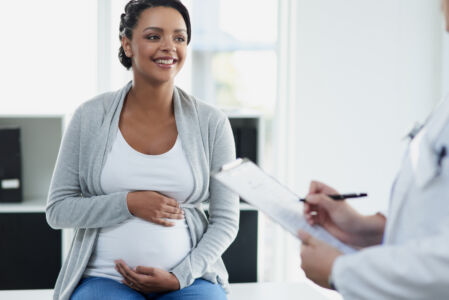
Unfortunately, pregnancy comes with some unpleasant side effects, including varicose veins and hemorrhoids. But you can do something about it.
Awaiting the birth of a child is a joyous time. But for many expectant mothers, pregnancy comes with some unwelcome side effects, including varicose veins, spider veins, and hemorrhoids, that can make what should be a happy time unpleasant or even painful.
When varicose veins, spider veins, and hemorrhoids develop, it’s a sign your veins aren’t pumping blood back to the heart as they should. The one-way valves that close and push blood up to the chest become weak and allow blood to collect within the vein walls. Eventually, the veins cannot hold the excess blood and varicose veins and spider veins appear on the legs. Much the same happens when veins in rectum enlarge and hemorrhoids result.
These conditions commonly occur during the latter months of pregnancy. Fortunately, you can prevent and calm the symptoms of varicose veins and hemorrhoids while you're expecting.
To nourish both you and your growing child, your body produces a surge of blood. Unfortunately, all that extra blood increases pressure in the veins — particularly the leg veins, which work the hardest against the force of gravity. When combined with the pregnancy hormone progesterone, which relaxes veins, it’s not surprising that your veins can swell during pregnancy. In addition, the growing uterus presses against the inferior vena cava, the vein that runs from legs to the heart, further straining the veins in the legs, rectum, and even the vaginal area.
Within months after delivery, varicose veins and hemorrhoids will disappear. While you wait for that day, you can minimize the chance of getting varicose veins or dealing with any uncomfortable symptoms, such as swelling, heaviness, and itching, by making some simple lifestyle changes.
Don’t Sit or Stand Too Long. When you sit or stand for long periods, blood tends to pool in the leg and pelvic veins because it’s not circulating as effectively. Get up and walk around for a few minutes every hour or so to quicken blood flow, and avoid crossing your legs when seated.
Exercise. Low-impact workouts like walking and swimming are great ways to strengthen your calf muscles which in turn support veins. Ask your doctor to recommend exercises you can do safely during your pregnancy.
Put Your Feet Up. Elevating your legs encourages blood to move toward the heart and not collect in the veins.
Wear Comfortable Clothes. Tight-fitting, restrictive clothing, especially around the waist or tops of legs, can impede circulation. Switch to comfortable, loose-fitting clothes and ditch the high heels for flat shoes.
Buy Maternity Support Hose. Unlike regular pantyhose, this specially made hosiery supports circulation by gently squeezing the veins in the leg and abdomen. Choose a pair that doesn’t bind at any point along the leg or waist.
Sleep on Your Left Side. Sleeping on your left side lightens the pressure on the vena cava, which is on your right side.
For hemorrhoid relief, sit in a warm tub or sitz bath for about 10 minutes a few times each day. Cold compresses applied to the area reduces swelling. Creams or medications (like stool softeners) may also help ease the pain of hemorrhoids, but always check with your doctor about which ones are safe to use while pregnant. To prevent constipation and straining that puts pressure on veins, eat a high fiber diet.
Although varicose veins and hemorrhoids diminish after delivery, if you notice any hardening of the veins, redness, or excessive bleeding from hemorrhoids, visit your doctor or a vein specialist. Treatment likely won’t be required, but it’s advisable to see if there are any other health problems that might be causing those symptoms. Your doctor can also recommend more tips for making your pregnancy as comfortable and happy as possible.
At Center for Vein Restoration, our physicians and staff focus exclusively on vein health. If you’re pregnant and have varicose veins, we’ll help you find ways to ease the symptoms so you’ll enjoy this special time. Contact us today for a consultation.